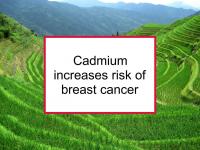Numerous studies have demonstrated that cadmium interacts with breast cancer cells in ways that promote their growth and proliferation. Cadmium functions as an endocrine disruptor, stimulating estrogen receptor (ER) activity and promoting uterine and mammary gland growth in mice.
Cadmium influences gene expression, modifying signaling in both normal and cancerous breast cells. Exposure to cadmium leads to reduced DNA repair capacity and genomic instability. The increased proliferation of cells with genomic instability is one possible mechanism for cadmium-induced breast cancer. Recently, the first large prospective study reported that cadmium increases the risk of breast cancer in postmenopausal women.
Latest research finds cadmium increases postmenopausal BC risk
The Swedish prospective study referenced at the beginning of this news article was designed to investigate the association between dietary cadmium exposure and risk of breast cancer. To date, no prospective population studies have been performed to examine the link between cadmium intake and breast cancer risk. The study included 55,987 postmenopausal women for whom dietary cadmium exposure was estimated at baseline in 1987.
The women were followed for an average of 12.2 years, during which time 2,112 were diagnosed with breast cancer (1,626 with ER+ tumors and 290 with ER-disease). The analysis was performed while adjusting for other factors that influence breast cancer risk, including intake of whole grains and vegetables (which account for 40% of the cadmium exposure, but also contain phytochemicals that are thought to protect against breast cancer).
The women were divided into three groups, according to their estimated level of dietary cadmium intake. Women with the highest cadmium intake were found to have a 21% higher risk of breast cancer compared to women with the lowest intake. The risk was highest among slender and normal weight women with high intake, for whom the risk was 27%. The risk was also higher risk for ER+ tumors than ER- tumors (for which the elevated risk did not reach statistical significance). The risk of breast cancer was found to decline with increasing consumption of whole grain/vegetables within each level of cadmium exposure, suggesting that whole grain/vegetable consumption protects against such exposure. The authors conclude that dietary cadmium might have a role in postmenopausal breast cancer development.
